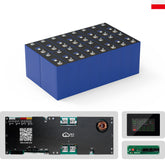12V vs 24V Inverters Key Differences and Which One is Right for You
When it comes to powering your devices off the grid or in remote locations, the choice between a 12V and 24V inverter can significantly impact your system’s performance and efficiency. The primary difference lies in the voltage, which directly affects factors such as power output, efficiency, and suitability for various applications. Whether you’re building a solar power system, outfitting an RV, or considering a backup power solution, understanding the differences between 12V vs 24V inverters is crucial to making an informed decision.
In this comprehensive guide, we’ll compare 12V vs 24V inverters in terms of their performance, pros and cons, and ideal use cases to help you decide which one best suits your needs.
- Understanding 12V vs 24V Inverters
- Power Output and Efficiency: 12V vs 24V Inverters
- Battery Life and Capacity: 12V vs 24V Inverters
- Size and Weight: 12V vs 24V Inverters
- Applications of 12V vs 24V Inverters
- Cost Considerations: 12V vs 24V Inverters
Understanding 12V vs 24V Inverters
Before delving into the specifics, it’s important to understand what an inverter does and why voltage matters.
What is an Inverter?
An inverter is a device that converts DC (direct current) power from sources like batteries or solar panels into AC (alternating current) power, which is the type of electricity used by most household appliances. Inverters come in different voltage configurations, with 12V and 24V being the most common. The key difference between the two lies in the amount of power they can handle and their efficiency.
Why Does Voltage Matter?
Voltage affects the overall performance of the inverter system. A 12V inverter is designed to handle lower power output and is typically suited for smaller applications, while a 24V inverter offers higher efficiency and can power larger systems without drawing excessive current.
>>See also Living Off The Grid Without Spending Money A Beginner’s Guide
Power Output and Efficiency: 12V vs 24V Inverters
One of the most significant differences between 12V vs 24V inverters is their power handling capabilities and efficiency.
Power Output and Current Draw
The 12V inverter is suitable for lower power needs, typically up to 1,500 watts, and is ideal for small appliances and devices. It draws more current from the battery to deliver the required power, which can be a limitation if you're running multiple devices or larger appliances.
A 24V inverter, on the other hand, can handle higher power loads, often up to 3,000 watts or more, with a more efficient current draw. Because the higher voltage allows for less current to be drawn from the battery, it results in lower energy losses and increased efficiency.
Efficiency Differences
Efficiency is an important factor when choosing between 12V vs 24V inverters. In general, 24V inverters are more efficient than their 12V counterparts, especially for larger systems. The efficiency difference becomes more noticeable as you increase the power demand of the system.
- 12V Inverters: Generally less efficient, especially as the power demand increases. You may experience energy loss due to higher current draw.
- 24V Inverters: More efficient at converting DC to AC, which means less energy loss, especially when powering larger appliances.
Battery Life and Capacity: 12V vs 24V Inverters
The battery bank you use will play a crucial role in how long your system can run before needing a recharge. 12V vs 24V inverters have different effects on battery life and capacity.
Battery Requirements for 12V Inverters
12V inverters typically require a larger battery bank to provide enough power for extended periods. The current draw of a 12V inverter is higher, so the battery bank must be able to supply sufficient amperage. This can mean more frequent recharging, especially when running high-power devices for long durations.
- Advantages: Easier to find and less expensive batteries for smaller systems.
- Disadvantages: Higher current draw can lead to faster battery depletion, especially in large systems.
Battery Requirements for 24V Inverters
24V inverters offer a significant advantage in terms of battery efficiency. Because the system operates at a higher voltage, the current draw is lower, which reduces the strain on the battery bank and prolongs battery life. This makes 24V inverters a better choice for larger systems or those that require long-lasting power.
- Advantages: Longer battery life, fewer batteries required, and more efficient power use.
- Disadvantages: Batteries for 24V systems tend to be more expensive and require careful sizing.
Size and Weight: 12V vs 24V Inverters
The physical size and weight of the inverter and battery bank are important factors, especially for mobile applications like RVs, boats, or off-grid cabins.
Size and Weight of 12V Inverters
12V inverters are typically smaller and lighter than their 24V counterparts, making them ideal for systems with limited space. They are easier to transport and install, especially in smaller off-grid setups.
- Advantages: Compact, lightweight, and ideal for portable or small-scale systems.
- Disadvantages: Larger battery banks are often required, adding to the total weight and space required.
Size and Weight of 24V Inverters
While 24V inverters are larger and heavier due to their higher voltage capacity, they offer a significant advantage in larger, stationary systems where space is less of an issue.
- Advantages: More power-efficient, fewer batteries required, ideal for larger or more permanent installations.
- Disadvantages: Heavier and bulkier, which may be a concern for portable applications.
Applications of 12V vs 24V Inverters
The right choice between 12V vs 24V inverters will depend largely on your specific application and energy needs.
Ideal Uses for 12V Inverters
12V inverters are ideal for smaller off-grid applications or those with minimal power needs. Common uses include:
- RVs and boats with basic electrical needs.
- Small cabins or sheds that only require minimal appliances.
- Backup power systems for single devices like lights or small appliances.
Ideal Uses for 24V Inverters
24V inverters are better suited for larger systems where you need to power multiple devices or larger appliances. They are commonly used in:
- Larger RVs or mobile homes with more electrical equipment.
- Off-grid homes that require more power.
- Solar power systems that need to run high-wattage appliances like refrigerators or air conditioners.
>>See also Reasons To Choose Self-Heating Lithium Iron Phosphate Batteries
Cost Considerations: 12V vs 24V Inverters
The initial cost of 12V vs 24V inverters can vary significantly, and it’s important to consider long-term savings as well.
Cost of 12V Inverters
12V inverters are generally more affordable, making them a popular choice for budget-conscious users. However, the lower efficiency may mean you need to invest in more batteries or a larger inverter over time.
- Initial Cost: Less expensive upfront.
- Long-Term Cost: Higher cost over time due to less efficiency and higher battery demand.
Cost of 24V Inverters
24V inverters have a higher upfront cost, but their increased efficiency and ability to power larger loads can save money in the long run. Less frequent battery replacements and lower energy losses can make the system more cost-effective over time.
- Initial Cost: Higher upfront investment.
- Long-Term Cost: More cost-effective in the long run due to fewer batteries and better performance.
When choosing between a 12V vs 24V inverter, it ultimately comes down to your specific energy needs and budget. 12V inverters are more affordable, compact, and ideal for smaller systems or lower power needs. However, they can be less efficient and require larger battery banks. On the other hand, 24V inverters offer greater efficiency, longer battery life, and the ability to handle larger systems, making them better suited for off-grid homes, larger RVs, or systems with high power demands.
Understanding the differences in power output, battery requirements, size, weight, and costs will help you make the right decision for your energy system. Whether you choose a 12V or 24V inverter, ensure that the system you select matches your power needs, space limitations, and long-term goals for energy independence.
























5 Comments
See best is 24v system
See best is 24v system
Leave a comment
All blog comments are checked prior to publishing